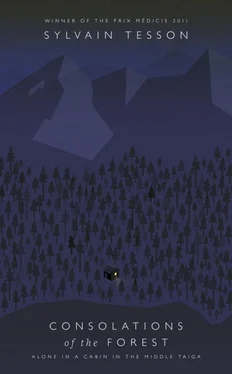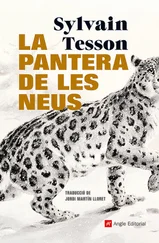Long wisps of mist are drifting seductively across the lake.
5 JULY
The insects react with the sensitivity of a seismograph to the faintest rise in temperature. As soon as the air reaches 37°F they hatch by the millions and churn the air in frenzied flight. The copulation of the capricorn beetles: the antennae touch lightly and the insects make love in statuesque immobility. I wouldn’t mind the visit of a young female Slovenian entomologist interested in studying this phenomenon. The ducks, well, they evoke the stability of the bourgeois ménage, gliding in their Sunday best, two by two, nodding discreetly to the other couples…
The world that I inhabit every day, from the clearing to the water’s edge, conceals treasures. In the grass, under the sand, armies are on the move. Their soldiers are jewels. They wear varnished armour, golden carapaces, malachite tunics or striped livery. Walking at North Cedar Cape, I never suspect that I’m treading on gems, cameos, diamonds. Some of them spring from the imagination of a Jugendstil jeweller, inspired by nature’s wonders and collaborating with a Faustian alchemist to bring brooches and enamels to life as they emerge from the oven.
Respecting insects brings joy. Taking a passionate interest in the infinitely small helps guard against an infinitely mediocre life. For the insect lover, a puddle can be Lake Tanganyika, a pile of sand takes on the aspect of the Taklamakan Desert, and a patch of brush becomes the Mato Grosso Plateau. Entering the geography of the insect gives grass the dimensions of a world.
6 JULY
When the lake is as slick as oil, the reflection is so pure that you could misread which half of the mirror image is which. My paddles send their echo cleanly to the forest. The reflection is the echo of the image; the echo is the image of the sound.
I catch a six-and-a-half-pound char. I read Bachelard’s philosophical reverie, The Psychoanalysis of Fire , by my own fire. A mist straight out of a Japanese print invades the shore, ‘beautiful like the ineffable, changeable like a dream, fleeting like love’ (Bachelard).
7 JULY
Insomnia. Regrets and discouragement are dancing a witches’ Sabbath in my skull. Sunrise shoos away the bats at 4.30 and I fall asleep at last.
Is it fatigue? When I get up at noon, I’m floating in a gentle daze. The prospect of happiness: a day that will bring me nothing new. No one on the horizon, no task to accomplish, no need to satisfy, no greeting to return. Eventually a few evening reverences to the seal and a squadron of eiders.
The cabin is a sidestep , where one can step aside. The haven of emptiness where no one is forced to react to everything. How to measure the comfort of these days free of all obligation to answer questions? I can now perceive the aggressive character of a conversation. Claiming to be interested in you, an interlocutor shatters the halo of silence, invades the shore of time, and calls upon you to answer his questions. All dialogue is a battle.
Nietzsche in Ecce Homo : ‘One must avoid chance, outside excitation, as much as possible; walling oneself up, so to speak, is an act of instinctive elementary wisdom, a part of intellectual gestation. Shall I permit an alien thought to secretly scale that wall?’ Further on, Nietzsche speaks in praise of impassive lethargy: ‘I see my future – a vast future – as a smooth sea: not a single wish disturbs the surface. Not for anything in the world would I want things to be different from what they are; as for me, I do not want to be different from what I am.’
Through some mystery, I stripped myself of all desire at the very moment when I was winning the maximum of freedom. I feel lacustrine landscapes developing in my heart. I have awakened the old Chinese hermit within me.
8 JULY
In the evening, I build a fire on the shore and grill my fish there.
The evening is the dying of a dream. All the elements of a Romantic era reverie take their places before my front-row seat at around eight o’clock: still waters, swirls of mist, pastel-tinted eddies, birds skimming in low to their nests. Nature flirts with kitsch without ever falling into it.
Today, struck by Nietzsche’s warning in Ecce Homo , I’m leaving the books alone: ‘I’ve seen this with my own eyes: gifted and rich natures “inclined toward freedom” who have “read themselves to death” by the time they are thirty, mere matches now, which must be struck to give off sparks – their “thoughts.”’ Compulsive reading relieves the anxiety that comes with tramping through the forest of meditation in search of clearings. Volume after volume, the reader settles for recognizing the expression of thoughts he was ‘working on’ intuitively. Reading is reduced to either discovering the formulation of ideas that had been floating around in one’s mind, or to the simple knitting together of connections among the works of hundreds of authors.
Nietzsche describes poor exhausted souls who can no longer manage to think unless they ‘look it up’. Only the squeeze of lemon can awaken the oyster.
Hence the appeal of those people who see the world with eyes free of all reference, for whom memories of reading never come between them and the substance of things.
There was once a girl in my life who knew how to forget what she had read and who felt devotion for all forms of life. In southern France, we crossed the Camargue, the largest river delta in Western Europe. We rowed through the salt marshes, along canals, across lagoons. Flights of flamingoes sailed through the sunset. We camped out at night with hordes of mosquitoes that I would squash, bombarding them with chemicals. She said she loved them: ‘They bite, but to each his own, and besides, they keep men away from infested places so that the other animals can live there in peace.’ Twenty-two days ago, she left me.
My friends Thomas Goisque and Bernard Hermann arrive at twilight in Sergei’s boat, and in the tradition of North Cedar Cape, we all get drunk on the beach, toasting lost loves and renewed friendships. Goisque is here on assignment for a magazine. Hermann has come to do what for decades has been the focus of his life as a Zen sage: the contemplation of shifting light on the skin of the world. He looks like a colonel in the Indian Army: white cotton jacket, tortoiseshell glasses. His blond moustache and the ‘Pugachev’s Rebellion’ look in his eye lead Russians to take him for a Don Cossack ataman, but he informs them in a pidgin inherited from his journeys through the Russia of Khrushchev and Brezhnev that although he has Creole, Jewish, Celtic, Baltic, Hispanic and Teutonic genes, he can’t think of a single Cossack ancestor.
9 JULY
Sergei left us a supply of seal fat yesterday. I paddle off southwards with Goisque to leave the stinking substance on some rocks in the hope of attracting a bear. From the table on my beach, I can keep watch via binoculars. I spend my hours with the promise of the bear.
My guests and I live together nicely. We fish, explore the riparian forests, and discuss the subtle distinctions between Russian nihilism, Buddhist acceptance, and peaceful Stoic ataraxia. Sometimes Goisque and Hermann tackle their memories of army life, at which point the conversation veers between the moment when Shi poetry became Tang… and the operations of the SDECE (France’s external intelligence agency from 1944 to 1982) when it was ‘militarized’ into the 11th Shock Parachutist Regiment.
10 JULY
The sky is more generous with its creatures than the forest. No bear comes to the rendezvous with the smelly fat, which is instead mobbed by barnacle geese, mergansers, tufted ducks and eiders. Two German kayakers arrive from the north at nightfall. They set up camp on the cape beach, about a third of a mile from the cabin, and come up to recharge their equipment on my solar batteries. We have to look at their photos, their films, exchange e-mail addresses. When you meet someone nowadays, right after the handshake and a quick glance you write down the website and blog information. Conversation has given way to a session in front of the screen. Afterwards, you won’t remember faces or tones of voice, but you’ll have cards with scribbled numbers. Human society’s dream has come true: we rub our antennae together like ants. One day we’ll just take a sniff.
Читать дальше












